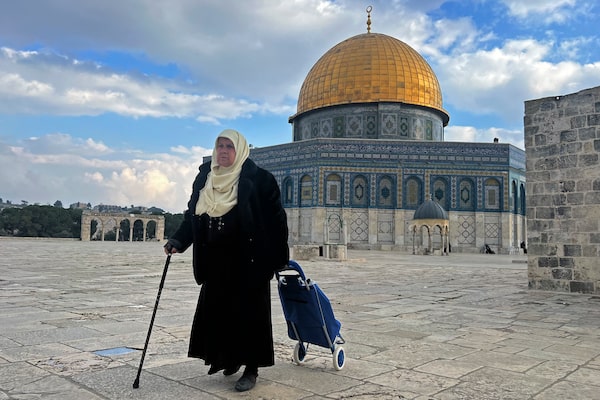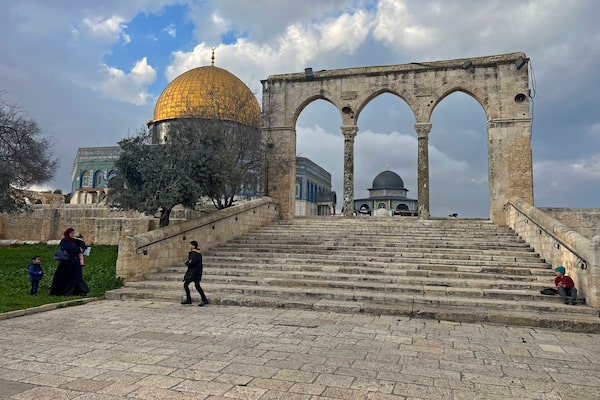
A Palestinian woman walks past the Dome of the Rock at the compound of the Al-Aqsa mosque in the Old City of Jerusalem on Feb. 20.AHMAD GHARABLI/Getty Images
Sheema Khan is the author of Of Hockey and Hijab: Reflections of a Canadian Muslim Woman.
Ramadan is the most beloved month of the Islamic calendar, a calendar whose months and days are determined by the celestial choreography of the Earth, the moon and the sun. Traditionally, it is a time of both fasting and celebration. This Ramadan, however, will be subdued, as Muslims in Canada and around the world witness the carnage in Gaza and the violent impunity in the West Bank with heavy hearts.
Each year in anticipation of Ramadan, many venture to glimpse the elegant sliver of the new crescent, gently suspended above the evening horizon. This marks the beginning of the holy month. After 29 days of fasting, Muslims will scour the sky for the new crescent, which marks the end of Ramadan and the celebration of Eid-al-Fitr. If no crescent is observed, a final, 30th day of fasting is completed. While calculations can be used to predict the beginning and end of Ramadan, there is a deep spiritual connection upon seeing the crescent hanging in the twilight sky.
Thus, a “day” of Ramadan begins at sunset, and ends at the next sunset. That first evening, likely Sunday, March 10, Muslims will gather at mosques to observe special night prayers, and will do so throughout the month. It is during Ramadan that the Quran was first revealed: verses commanding believers to read, reflect on their humble origins, the generosity of God, and remember that knowledge is bestowed by the Almighty. Muslims worldwide will recite Quranic verses, listen to melodious reading by a qari (a person who follows the rules of recitation), and contemplate its meaning. They will seek the “Night of Power,” during the last 10 nights, praying for good in this life and the next. The past few years, I have joined a group of Toronto-based women via Zoom at dawn to study the entire Quran through Ramadan. It has been a spiritual feast, with bonds forged on faith.
As the white thread of dawn approaches, many will rise for a predawn meal – even for a sip of water. For able-bodied Muslims past the age of puberty, the fasting begins at dawn – when the sun is still below the horizon, prior to sunrise – and ends at sunset. No food, no liquids whatsoever, no intimate relations between spouses are permitted. Prior to dawn, we make our intention to fast purely for the sake of God, for the fast is foremost a spiritual act.
Each person’s experience is unique. After the first day or two of adjusting to this new schedule, a rhythm sets in. As one’s physical appetite decreases with each passing day, one’s spiritual thirst increases, satiated by God-consciousness through various acts of worship.
Fasting is not meant to be a hardship. For example, those who are ill, travellers, and women who are lactating, pregnant, menstruating or have recently given birth are exempt and can make up the missed fast later, or pay for the feeding of one poor person for each missed day. I went three consecutive years without fasting when my children were born 13 months apart, and I nursed for a year. I felt a special agency to have the choice not to fast, in order to nourish myself and the growing life inside my womb, or rahm, which in Arabic connotes mercy and compassion.
No one is excluded from spiritual participation. Anyone who contributes toward the break-fast meal, or iftar, receives the reward of the fasting person. In fact, Ramadan is a month for enhanced charity, with an emphasis on providing for those who are hungry.
In 2012, Ziyaad Mia, a Toronto lawyer, decided to donate the money he saved on food during Ramadan to a local food bank. He grew that campaign to include people of all faiths, or none, through Give 30, a program where people are encouraged to bring brown-bag lunches instead of buying, and give the proceeds to participating food banks across the country. It’s run entirely by volunteers, and has raised more than $2-million since 2012. Public schools have participated in Kitchener-Waterloo, and last year, the program expanded to New York. In the spirit of compassion, kindness and solidarity, each of us can help to alleviate food insecurity, which affects roughly 18 per cent of Canadians.
This year, the traditional daily iftar won’t have its normal celebratory feeling. We are all too aware that the temporary hunger we face daily for a few hours is incomparable to the growing famine in Gaza. In Islam, the parable of the believers in their affection, mercy and compassion for each other is that of a body: when any limb aches, the whole body reacts with sleeplessness and fever.

Palestinians walk past the Dome of the Rock at the compound of the Al-Aqsa mosque in the Old City of Jerusalem on Feb. 20.AHMAD GHARABLI/Getty Images
Our hearts have been aching for months as we witness Picasso’s Guernica in real time. At least 20,000 women and children have been killed; tens of thousands have been maimed, sickened and orphaned; roughly two million have been displaced; the bulk of the territory’s infrastructure has been destroyed. Canadian Palestinian families are reeling under grief as a nakba – a catastrophe – takes place before our very eyes. Out of sensitivity for the suffering of Palestinians, the Harmony Iftar, an annual event in Ottawa where ambassadors and politicians join local Muslims in celebration of cultural and religious diversity, has been cancelled.
Many mosques will open their doors and offer a daily iftar. During Ramadan, mosques normally welcome elected officials to connect with Canadian Muslims gathered for worship. This year, however, is different. More than 300 Muslim organizations have signed onto a statement denying such an opportunity to any MP who cannot commit to five principles that uphold the humanity of their Palestinian sisters and brothers: condemnation of war crimes in Gaza, supporting an immediate ceasefire, demanding the resumption of funding for UNRWA, opposing the flow of arms to Israel, and upholding the right of Canadians to express solidarity with Palestinians without fear of reprisal.
There is also grave concern about the possibility of restricting access to the Al-Aqsa Mosque in Jerusalem, the third-holiest site in Islam, during the sacred month of Ramadan. It is a move opposed even by Israeli security officials, and if it happens, it would be considered by many as a continued provocation, following the incursion into the mosque complex by Israeli settlers last October. Israeli police stormed the mosque during the past three Ramadans, using stun grenades, tear gas and rubber-coated steel bullets against Palestinian worshippers in 2021, injuring hundreds. This has outraged Muslims worldwide. Hamas has tapped into this anger, and is calling for Palestinians to march to Al-Aqsa on the first day of Ramadan. The U.S. has urged Israel to allow Palestinians access to the site.
Indeed, this Ramadan will be a sombre one in the midst of this pain that is weighing so heavily upon us. This year, more than ever, we will seek solace in the wisdom of the Quran, which exhorts Muslims to recite “God is sufficient for us, and He is the best disposer of affairs,” when faced with overwhelming circumstances.